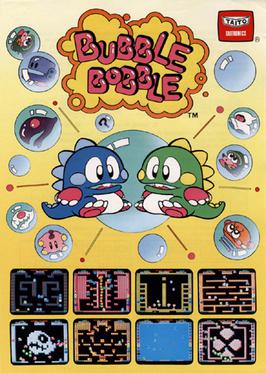
Bubble Bobble is a 1986 platform game developed and published by Taito for arcades. It was distributed in the United States by Romstar, and in Europe by Electrocoin. Players control Bub and Bob, two dragons that set out to save their girlfriends from a world known as the Cave of Monsters. In each level, Bub and Bob must defeat each enemy present by trapping them in bubbles and popping, who turn into bonus items when they hit the ground. There are 100 levels total, each becoming progressively more difficult.

Arkanoid is a 1986 block breaker arcade game developed and published by Taito. In North America, it was published by Romstar. Controlling a paddle-like craft known as the Vaus, the player is tasked with clearing a formation of colorful blocks by deflecting a ball towards it without letting the ball leave the bottom edge of the playfield. Some blocks contain power-ups that have various effects, such as increasing the length of the Vaus, creating several additional balls, or equipping the Vaus with cannons. Other blocks may be indestructible or require multiple hits to break.

Breakout is an arcade video game developed and published by Atari, Inc. and released on May 13, 1976. It was programmed by Steve Wozniak and designed by Wozniak, Nolan Bushnell, Steve Jobs, and Steve Bristow, who were influenced by the 1972 Atari arcade game Pong.
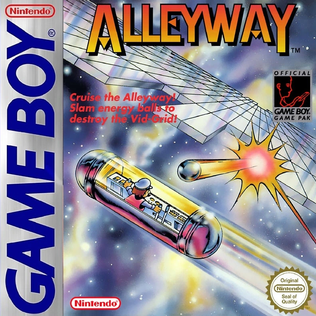
Alleyway is a 1989 video game developed by Nintendo and Intelligent Systems and published by Nintendo as a global launch title for the Game Boy. It is a Breakout clone and one of the first four games developed and released for the system. The game was released first in Japan in 1989, in North America later that year, and in Europe in 1990. It was later re-released for the Nintendo 3DS Virtual Console in June 2011, and on the Nintendo Switch Online service in May 2024.
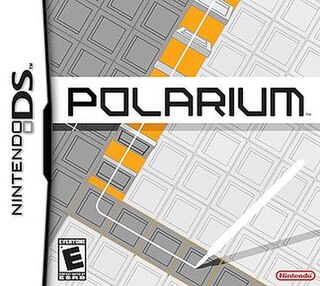
Polarium is a puzzle game developed by Mitchell Corporation and published by Nintendo for the Nintendo DS. It was a launch title in Japan, Europe and China. In the game, players use a stylus to draw lines on the DS's touch screen, flipping black and white tiles to clear puzzles.

Nanostray is a vertically scrolling shooter for the Nintendo DS. The user takes control of a futuristic spacecraft against a horde of enemies. A sequel, Nanostray 2, was released in 2008.

Kirby’s Block Ball, known in Japan as Kirby no Block Ball, is a video game developed by Tose and Nintendo and published by Nintendo for the Game Boy. It is a spin-off of the Kirby video game series. It is a Breakout clone; the player controls paddles along the screen's edge to knock a bouncing ball, Kirby, into destructible bricks. The game's 55 levels include power-ups, bonus rounds, and minigames. The team spent half a year revising the gameplay to match Kirby's signature characteristics. Kirby's Block Ball was released in Japan on December 14, 1995, later in North America on May 13, 1996, and finally in Europe on August 29, 1996.

Cutie Q is a 1979 block breaker/video pinball hybrid arcade game developed and published by Namco in Japan. The player controls a set of paddles with a rotary knob, the objective being to score as many points possible by deflecting a ball against blocks, ghosts, spinners and other objects on the playfield. It was designed by Shigeru Yokoyama, with spritework done by Toru Iwatani. It is the third and final game in the Gee Bee trilogy.

Arkanoid: Revenge of Doh is an arcade game released by Taito in 1987 as a sequel to Arkanoid.
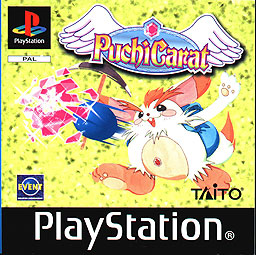
Puchi Carat is a 1997 video game by Taito.

Space Invaders Extreme is a re-vamped incarnation of the classic arcade game Space Invaders. The DS and PSP versions were released to mark the 30th anniversary of Space Invaders which saw its original arcade release in 1978. An HD version of the game has been remastered by Backbone Entertainment for Xbox Live Arcade with new four-player multiplayer modes and visualizer backgrounds by Jeff Minter, it was released on 6 May 2009 as a wrap-up to the 30th anniversary. The game is played at a fast pace with an electronic soundtrack and sound effects.

Break 'Em All, known as Brick 'Em All DS in Europe, is an Arkanoid clone released in 2005 for the Nintendo DS. The game features several single-player modes, as well as single-cart multiplayer for up to 8 players. The game utilized the system's touch screen to control the paddle, as well as activate power-ups. Power-Ups can be activated by pressing up on the D-Pad or by pressing the X Button.
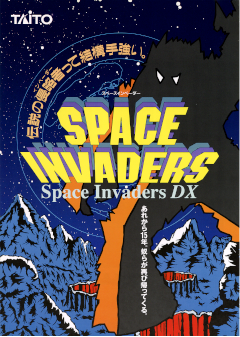
Space Invaders DX is a 1993 fixed shooter arcade game developed and published in Japan by Taito. It has been re-released for several consoles since, including the Super Nintendo Entertainment System, PC Engine Super CD, and Sega Saturn — several of these conversions use the name Space Invaders: The Original Game. The player assumes control of a laser base that must fend off waves of incoming enemies, who march down in formation towards the bottom of the screen. It is the fifth entry in the long-running Space Invaders series. DX contains four variations of the original Space Invaders, in addition to a multiplayer mode and a "Parody Mode" that replaces the characters with those from other Taito franchises. Home ports of DX received mixed reviews for their high price point and general lack of content.

Shatter is an action video game developed and published by Sidhe. The game was released on July 23, 2009 for PlayStation 3 via PlayStation Network, on March 15, 2010 for Microsoft Windows, on September 18, 2012 for OS X, and on March 14, 2013 for Linux. A remastered version developed by Sidhe's successor PikPok and published by Netflix was released for iOS and Android via Netflix Games on March 23, 2022. A version of the mobile remaster published by PikPok, subtitled Remastered Deluxe, was released on November 2, 2022 for Windows, Nintendo Switch, PlayStation 4, PlayStation 5, Xbox One, and Xbox Series X/S.

Space Bust-A-Move is a puzzle video game developed by Lancarse and published by Taito in Japan, and Square Enix worldwide for the Nintendo DS. It was first released in Japan under the title Space Puzzle Bobble on December 18, 2008. It was later released in North America under the title Space Bust-A-Move on July 28, 2009, and in Europe under the title Puzzle Bobble Galaxy on August 28, 2009. As with Arkanoid DS, Space Invaders Extreme and Space Invaders Extreme 2, the game is compatible with Taito's paddle controller.

Arkanoid: Doh It Again is a Super NES and Windows game. It was first released by Taito in Japan on the Super Famicom and Windows, while Nintendo published the Super NES version in Australia, the US, and the UK. It is the third installment in the Arkanoid series after the original 1986 arcade game and its sequel Arkanoid: Revenge of Doh.

Devilish is an action video game that was released for the Game Gear.

Quester is a 1987 block breaker arcade game developed and published in Japan by Namco. Controlling a paddle-like craft, the player is tasked with clearing each stage by deflecting a ball towards a formation of bricks towards the top of the screen. Power-up items are hidden in some blocks, which can increase the size of the player's paddle, a barrier that prevents the ball from moving off the screen, and a forcefield that will release eight other balls when touched.

Arkanoid vs Space Invaders is a paid mobile game developed by Taito and published by Taito in Japan and Square Enix worldwide. As the name suggests, it is a crossover between Arkanoid and Space Invaders and has gameplay elements adapted from both games. The game was released without any prior announcement by Square Enix internationally on May 17, 2017. It was re-released on Nintendo Switch and PlayStation 4 as part of Space Invaders Invincible Collection and Space Invaders Forever.


















